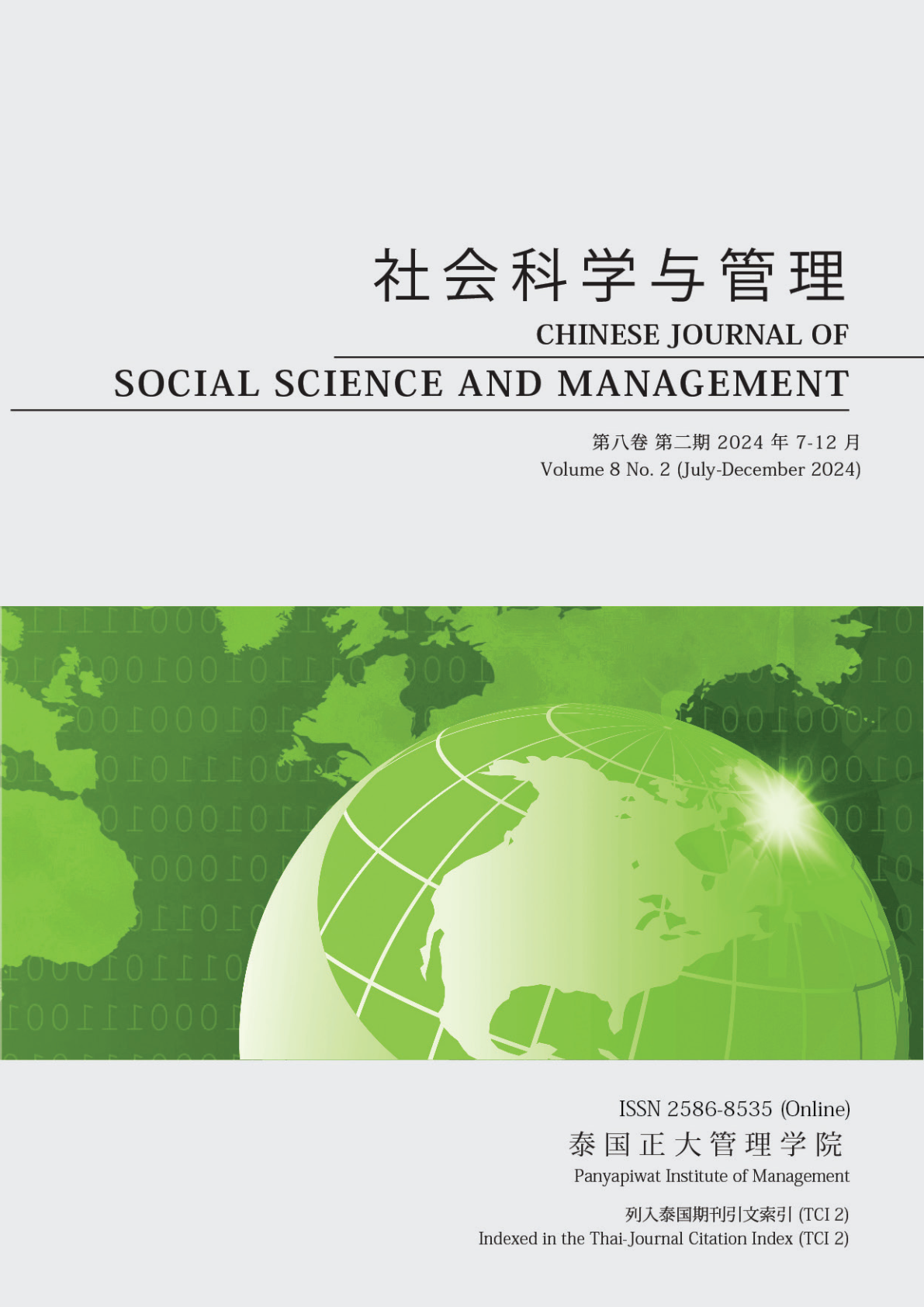THE INFLUENCE OF RURAL E-COMMERCE ENTREPRENEURS’ ENTREPRENEURIAL MOTIVATION ON ENTREPRENEURIAL PERFORMANCE: TAKING RURAL E-COMMERCE ENTREPRENEURSHIP IN W TOWN, GUANGXI AS AN EXAMPLE
Main Article Content
Abstract
In order to deeply explore the impact of rural e-commerce entrepreneurs’ entrepreneurial motivation on entrepreneurial performance, the impact of entrepreneurial intention on entrepreneurial performance, and the mediating role of entrepreneurial willingness as an intermediary, entrepreneurial motivation as an independent variable, and entrepreneurial performance as a dependent variable, the literature review, case analysis, and questionnaire survey methods were used. In the early stage, a theoretical model was established based on the review of the literature, and the research assumptions and questionnaires were designed. Following this, a comprehensive and scientific questionnaire survey was conducted on rural e-commerce entrepreneurship in W Town, Guangxi Province as an example. The results show that rural e-commerce entrepreneurs’ life motivation, resource advantage motivation, and self-realization motivation have a positive effect on entrepreneurial performance, and rural e-commerce entrepreneurs’ life motivation, resource advantage motivation, and self-realization motivation have a positive effect on entrepreneurial intention. Moreover, entrepreneurial intention has a significant positive relationship with entrepreneurial performance, and entrepreneurial intention has a partial mediating effect between entrepreneurial motivation and entrepreneurial performance. It was also found that the research results of this paper, on the one hand, explore the relationship among the entrepreneurial motivation, entrepreneurial willingness and entrepreneurial performance of rural online platforms to a certain extent, and deeply explore the mechanism of the two under the role of rural e-commerce entrepreneurial platforms, while on the other hand, it can also provide a certain degree of guiding significance for rural e-commerce entrepreneurship in reality, which will help rural e-commerce entrepreneurship to be more scientific and reasonable.
Article Details

This work is licensed under a Creative Commons Attribution-NonCommercial-NoDerivatives 4.0 International License.
Chinese Journal of Social Science and Management Editorial Division
The Office of Research and Development, Panyapiwat Institute of Management
85/1 Moo 2, Chaengwattana Rd., Bang Talat, Pakkred, Nonthaburi 11120, Thailand
Tel. 02 855 01048 E-mail: cjssm@pim.ac.th
References
Almandoz, A. (2014). Predictors and financial outcomes of corporate entrepreneurship: An exploratory study. Journal of Business Venturing, 6(4), 259-285.
Audretsch, S. (2018). Entrepreneurship in Japan and Silicon Valley: A comparative study. Technovation, (10), 595-606.
Bontis, N., Crossan, M., & Hulland, J. (2002). Managing an organizational learning system by aligning stocks and flows. Journal of Management Studies, 39(4), 437-469.
Buligaetal, W. (2020). Dynamic model of entrepreneurial learning. Entrepreneurship: Theory and Practice, 25(3), 5-16.
Carland, H. (2018). Internal corporate entrepreneurship. Encyclopedia of Entrepreneurship, 209, 223.
Carsrud, M., & Brnback, L. (2018). A behavioral model of entrepreneurial supply. Journal of Small Business Management, 24(4), 45-53.
Chen, Y. S. (2019). Research on the application of e-commerce in agricultural products based on value chain analysis. Reform and Strategy, 4, 61-63.
Connolly, M. (2018). Effects of self-concept traits and entrepreneurial orientation on firm performance. International Small Business Journal, 24(1), 61-82.
Dew, N., Read, S., Sarasvathy, S. D., & Wiltbank, R. (2009). Effectual versus predictive logics in entrepreneurial decision-making: Differences between experts and novices. Journal of Business Venturing, 24(4), 287-309.
Fan, W., & Wang, C. (2019). Discussion on the application of mobile e-commerce in agricultural products market. Economic Tribune, 2, 56-57.
Grande, T. (2017). Toward the development of a measuring instrument for entrepreneurial mo-ovation. Journal of Developmental Entrepreneurship, 6(2), 189-201.
Jiang, J. Y., & Guo, H. D. (2018). Discussion on the e-commerce of agricultural products carried out by farmers’ professional cooperatives. Zhejiang Agricultural Science, 2, 262-265. [in Chinese]
Li, Y. (2017). An analysis of the resettlement path of rural surplus labor from the perspective of rural e-commerce development. Agricultural Economic Issues, 3, 62-68.
Lu, K. (2018). The development dilemma and countermeasures of rural e-commerce under the background of digital economy. Business Economic Research, (5), 101-104.
Mansfield, P., & Busse, M. (2018). The costs and benefits of ownership: A theory of vertical and lateral integration. Journal of Political Economy, 94(4), 691-719.
Peng, R., & Luand, D. (2018). Self-determination theory and the facilitation of intrinsic motivation, social development, and well-being. American Psychologist, 55(1), 68-78.
Robichaud, N. (2018). Entrepreneurial moti-vation. Human Resource Management Review, 13(2), 257-279.
Sandberg, L., & Hofer, T. (2019). Entrepreneurial motivations: What do we still need to know? Journal of Small Business Management, 49(1), 9-26.
Wang, J., & Zha, J. (2019). Problems and countermeasures for the development of e-commerce in rural China. Zhongzhou Academic Journal, 9, 43-47. [in Chinese]
Wang, X. (2017). Research on the income-increasing effect of e-commerce development of agricultural products. Economic System Reform, 5, 86-92. [in Chinese]
Wang, Y. R. (2018). Is the e-commerce economy a perfect combination of efficiency and fairness. Contemporary Economic Science, 3, 80-127. [in Chinese]
Wei, R. (2019). Analysis of the current situation, influencing factors and countermeasures of farmersn entrepreneurship. Jianghai Academic Journal, (1), 217-222. [in Chinese]
Xu, Z. D. (2019). Research on the concept of e-commerce. Consumer Guide, 2, 120-121. [in Chinese]
Xue, Y. (2014). Research on the integration of agricultural product supply chain based on e-commerce platform. Economic Issues, 1, 87-90.
Yi, L. (2019). Predictors and financial outcomes of corporate entrepreneurship: An exploratory study. Journal of Business Venturing, 6(4), 259-285.
Yu, D. (2018). Agricultural product circulation and e-commerce. Chinese Market, 43, 54-55.
Zhao, X., & Zhou, S. (2006). Overview of the concept and characteristics of e-commerce. Modern Communications, 1, 16-18. [in Chinese]
Zhong, S. X. (2020). The relationship of entrepreneurial traits, skill, and motivation to subsequent venture growth. Journal of Applied Psychology, 89(4), 587-598. [in Chinese]
Zhu, J. H. (2017). Innovation-oriented research on the development of rural e-commerce clusters: An analysis based on Suichang model and Shaji model. Agricultural Economic Problems, 10, 60-69. [in Chinese]


